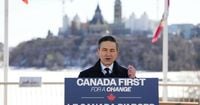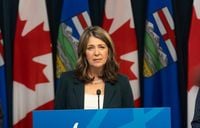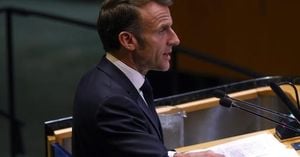The Canadian political arena brims with tension as Alberta Premier Danielle Smith's recent remarks have thrown a wrench into Pierre Poilievre's campaign, which was initially viewed as a potentially smooth path to the prime ministership. Recent comments from Smith have complicated Poilievre's bid as he navigates the challenges posed by his association with the Trump administration and its implications for Canadian sovereignty.
During a resurfaced interview with the far-right media outlet Breitbart, conducted in early March, Smith openly stated that the perspective Poilievre would bring to the position of prime minister would align closely with the "new direction in America." Furthermore, she suggested that U.S. President Donald Trump should pause tariffs on Canadian goods to benefit Poilievre's electoral chances.
"What I fear is that the longer this dispute goes on, politicians posture, and it seems to be benefiting the Liberals right now. So I would hope that we could put things on pause is what I’ve told administration officials," Smith declared, underscoring her concern about the political fallout of ongoing tariff disputes.
This admission has raised serious concerns about foreign interference in Canadian elections, prompting critics to call Smith's suggestions a blatant invitation for U.S. meddling. Calgary Mayor Naheed Nenshi, leader of Alberta's New Democrats, criticized Smith, stating, "Calling for a pause on tariffs to politically benefit one party or another isn’t the right approach. But standing firm for Canada is.”
Making matters worse for Poilievre, Smith's comments seem to resonate with some of the Conservative party's base, who hold a strong affinity for Trump. Poilievre must now distance himself from Trump’s influence while simultaneously appealing to supporters who admire the former U.S. president. As David Coletto, CEO of Abacus Data, noted, Poilievre is in a precarious position, as distancing himself from Trump risks alienating a significant portion of his voter coalition.
Analysts highlight that Smith has unwittingly become a thorn in Poilievre's side, undermining Conservative efforts to project an image distinct from Trump’s controversial approach to governance. On the campaign trail, Poilievre has encountered difficulties in presenting a “Canada first” narrative devoid of the Trump shadow. On the launch of his campaign on a sunny day in Ottawa, with the slogan “Canada first for a change,” all eyes turned not to his plans for the future but to the growing implications of Smith's words.
Poilievre earlier attempted to counter Smith’s comments by sidestepping a direct question about their appropriateness, merely reiterating Trump's assertion that it might be easier for him to deal with a Liberal government. “Electing Liberals will weaken our country,” he stated, but this vague retort is unlikely to satisfy a public weary of the shadow Trump's regime casts over Canadian politics.
Smith’s involvement has complicated the Conservative narrative crafted to present a united front as they critique the Liberal government through a lens of Canadian nationalism. Critics argue that Poilievre must take a definitive stance against Smith's overtures to the Trump administration if he hopes to win the trust of voters who are wary of foreign influence in Canadian elections.
As the election approaches, Poilievre's challenges grow more daunting, given that the Liberal Party's Mark Carney is poised to draw contrasts between his party's vision and Poilievre’s perceived alignment with Trump. Carney has already declared this election as a choice between unifying governance for Canada versus division spurred by americanization, a sentiment that could resonate deeply with Canadian voters.
Furthermore, Smith has hinted at potential national unity crises unless certain demands are met by the next Prime Minister within six months, complicating Poilievre's campaign further. This includes demands like the repeal of environmental regulations, which could align his party with a narrative of division rather than collaboration.
The backlash against Smith also demonstrates a growing rift within the Conservative Party, with some members and supporters questioning her remarks and their suitability in the context of national elections. Observers are watching closely to see if Poilievre manages to regain control of his campaign narrative before the election heats up. Such dynamics will be key in determining whether he can unify his base while explaining his policies distinct from those of Trump.
In the coming weeks, Smith and Poilievre must navigate these turbulent political waters with care. Each event and statement will carry weight as the Canadian populace increasingly scrutinizes the constitutionality and respect of governmental practices amidst the whispers of U.S. intervention. For Poilievre, the stakes couldn't be higher, as election strategies pivot in real-time and the narrative unfolds based on the growing political tension surrounding Smith's influence.
As political analysts lay out forecasts for election outcomes, the Conservative message must reintroduce itself and resonate with Canadians wanting assurance of their sovereignty and a clear vision forward, free of foreign interference. For now, the bridge Poilievre hoped to build between conservative ideals and the wider electorate rests precariously upon a foundation of growing discord, shifting political alliances, and a population vigilant of its democracy.






